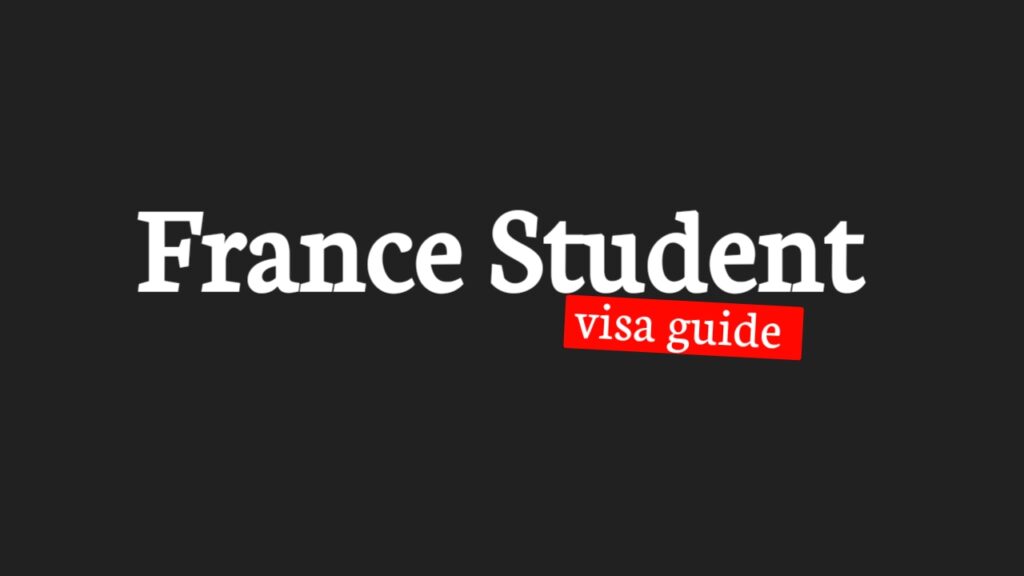France, with its rich cultural heritage, world-renowned educational institutions, and vibrant student life, is a sought-after destination for international students.
Whether you are pursuing an undergraduate degree, a master’s, or a Ph.D., understanding the process of obtaining a student visa is crucial.
This guide provides detailed information on the steps involved, necessary documents, and key tips to ensure a smooth application process.
Understanding the French Student Visa
France offers several types of student visas depending on the length and nature of your study program. The primary visa categories include:
1. Short-Stay Visa (Visa de court séjour pour études): This visa is for courses or training programs lasting up to 90 days. It is suitable for students attending short courses or participating in conferences.
2. Temporary Long-Stay Visa (Visa de long séjour temporaire pour études): Valid for 3 to 6 months, this visa is ideal for students enrolled in short-term programs or exchange programs that exceed 90 days but are less than six months.
3. Long-Stay Visa (Visa de long séjour pour études): Also known as the ‘VLT-TS’, this visa is for students who plan to study in France for longer than six months. It serves as both a visa and a residence permit, allowing students to stay in France for the duration of their study program.
Eligibility Criteria
To be eligible for a French student visa, you must meet the following criteria:
– Admission to a French Institution: You must have an acceptance letter from a recognized French educational institution.
– Financial Resources: Proof of sufficient financial means to support yourself during your stay is required. The French government stipulates a minimum of €615 per month.
– Health Insurance: You need to have health insurance coverage. EU students can use their European Health Insurance Card (EHIC), while non-EU students must arrange private health insurance.
– Proof of Accommodation: Documentation proving your accommodation arrangements in France, whether it’s a student residence, rental agreement, or a letter from a host.
Application Process
Step 1: Secure Admission
The first step in the visa application process is securing admission to a French educational institution. Ensure that you apply well in advance and meet all the academic and language requirements specified by the institution.
Step 2: Prepare Your Documents
Gather the necessary documents required for the visa application. These typically include:
– **Visa application form**: Completed and signed.
– **Valid Passport**: Must be valid for at least three months beyond your intended stay.
– **Passport-sized photos**: Recent and meeting the visa photo requirements.
– **Acceptance Letter**: From your French institution.
– **Proof of Financial Resources**: Bank statements, scholarship award letters, or financial guarantor letters.
– **Proof of Accommodation**: Rental agreement, dormitory confirmation, or a letter from a host.
– **Proof of Health Insurance**: Coverage details.
– **Proof of Payment for Visa Fee**: Receipts or bank transfer proofs.
### Step 3: Schedule an Appointment
Contact the French consulate or embassy in your country to schedule a visa appointment. Many consulates require you to book appointments online through their official websites. Due to high demand, especially before academic terms begin, schedule your appointment well in advance.
### Step 4: Attend the Visa Appointment
Attend the appointment with all your prepared documents. During the appointment, you may be required to provide biometric data (fingerprints and photograph) and undergo an interview. Be prepared to answer questions about your study plans, financial situation, and accommodation arrangements.
### Step 5: Await Visa Decision
After your appointment, the consulate will process your application. Processing times vary, but it typically takes between two to four weeks. In some cases, it may take longer, so apply early to avoid last-minute issues.
### Step 6: Travel to France
Once your visa is approved, you will receive a visa sticker in your passport. With this, you can travel to France. Remember to carry all essential documents, including your acceptance letter, proof of financial means, and accommodation details, as you may need to show them at the border control.
## Post-Arrival Requirements
Upon arrival in France, there are a few formalities to complete:
– **Validation of Long-Stay Visa**: If you hold a VLT-TS, you must validate it within three months of arrival through the French Immigration and Citizenship Office (OFII).
– **Residence Permit**: For stays longer than a year, you will need to apply for a residence permit.
– **Register at Your Institution**: Complete your registration at the French educational institution and attend orientation sessions.
Tips for a Smooth Application Process
– **Start Early**: Begin your application process as soon as you receive your acceptance letter to avoid delays.
– **Accurate Documentation**: Ensure all documents are accurate and up-to-date.
– **Consular Websites**: Regularly check the official website of the French consulate in your country for updates and specific requirements.
– **Seek Assistance**: If you encounter any issues, seek assistance from your institution’s international office or professional visa services.
Obtaining a student visa for France involves meticulous preparation and adherence to the guidelines. By following this comprehensive guide, international students can navigate the process with confidence and look forward to an enriching educational experience in France.


